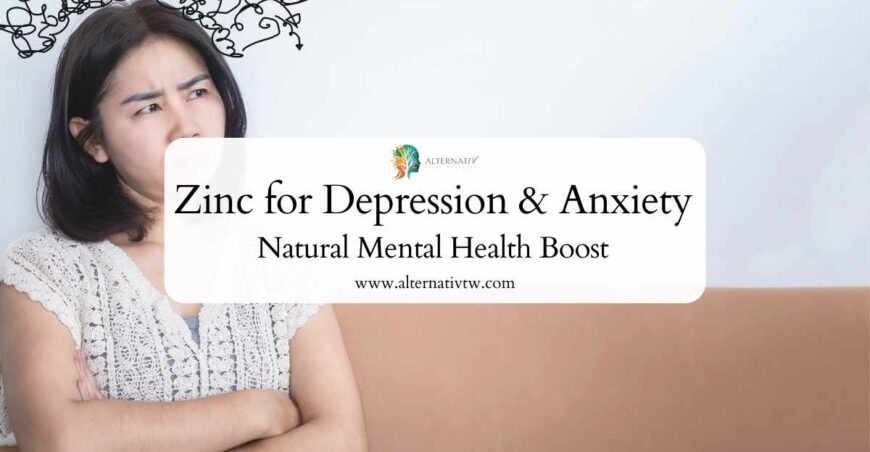Introduction
Depression and anxiety affect millions of people worldwide, making mental health a growing concern. While therapy and medications are standard treatments, many seek natural ways to improve their well-being, such as using zinc for depression and anxiety. One such natural aid is zinc—an essential mineral that plays a key role in brain function and mood regulation.
What is Zinc?
Zinc is a vital trace mineral involved in a wide range of biological processes, including immune defense, cell growth, wound healing, and brain function. The brain stores high concentrations of zinc, where it supports cognitive ability, learning, and emotional regulation.
Because the body doesn’t store excess zinc, it’s important to maintain a steady intake through diet or supplements. Zinc-rich foods include:
-
Meat (beef, lamb, poultry)
-
Shellfish (especially oysters and shrimp)
-
Nuts and seeds (pumpkin seeds, sesame seeds, cashews, almonds)
-
Dairy products (cheese, yogurt)
-
Legumes (chickpeas, lentils)
-
Whole grains
How Zinc Supports Brain Health
Zinc contributes to multiple neurological processes that influence mental health. Here’s how this mineral impacts the brain:
1. Regulates Neurotransmitters
Zinc helps balance neurotransmitters such as glutamate, dopamine, and serotonin—all crucial for mood regulation. Disruptions in these systems are closely linked to depression and anxiety.
2. Supports Neurogenesis
This mineral aids in the growth and repair of brain cells, particularly in the hippocampus—a brain region critical for memory and emotional processing.
3. Reduces Inflammation
Chronic inflammation has been identified as a contributing factor in depression. Zinc’s anti-inflammatory properties may help ease these symptoms by lowering inflammatory markers.
4. Balances the Stress Response
Zinc plays a role in regulating the hypothalamic-pituitary-adrenal (HPA) axis, which governs the body’s response to stress. Low zinc levels can lead to elevated cortisol, increasing the risk of mood disorders and anxiety.
Zinc and Depression
Numerous studies have revealed a strong link between low zinc levels and depressive symptoms. A comprehensive meta-analysis concluded that individuals with depression often have significantly lower zinc concentrations than those without the condition.
Supplementation appears to amplify the effects of antidepressants. In one clinical study, patients with major depressive disorder who took zinc alongside standard medication experienced greater mood improvements than those relying on medication alone. These findings highlight the potential of zinc for depression and anxiety as a valuable adjunct to traditional treatments.
Zinc and Anxiety
A lack of zinc is also associated with heightened anxiety. Because zinc modulates both neurotransmitter activity and stress hormone levels, deficiencies can lead to emotional instability. Some research suggests that increasing zinc—especially when combined with magnesium—can reduce anxiety symptoms.
Signs of Zinc Deficiency
Zinc deficiency is more common than many people realize, particularly among those with poor nutrition, digestive issues, or high stress levels. Symptoms may include:
-
Frequent infections
-
Brain fog or poor concentration
-
Mood swings, irritability, or depression
-
Loss of appetite
-
Poor wound healing
-
Hair loss
-
Decreased sense of taste or smell
How to Increase Zinc Intake
Maintaining healthy zinc levels starts with a nutrient-rich diet. The best sources include:
-
Oysters (the most concentrated source)
-
Red meats (beef, lamb, pork)
-
Poultry (chicken, turkey)
-
Eggs
-
Dairy (cheese, yogurt)
-
Nuts and seeds (pumpkin seeds, almonds)
-
Legumes (chickpeas, lentils)
Zinc Supplements for Mental Health
If your diet falls short, supplements can be a practical way to boost zinc levels. Keep the following tips in mind:
1. Choose the Right Form
Look for highly absorbable forms like zinc picolinate, zinc citrate, or zinc gluconate.
2. Proper Dosage
While the general recommended intake is 8–11 mg per day for adults, therapeutic doses for mental health may range from 25–40 mg daily. Always consult a healthcare provider before starting higher doses.
3. Balance with Copper
Excessive zinc can deplete copper, another essential mineral. Choose supplements that maintain a proper zinc-to-copper ratio or add a copper supplement as advised by your doctor.
Conclusion
Zinc is a powerful but often overlooked nutrient that plays a significant role in maintaining mental health. Its influence on neurotransmitter regulation, inflammation reduction, and stress balance makes it a valuable ally in managing depression and anxiety.
Incorporating zinc-rich foods into your diet—or supplementing when necessary—can support mood and cognitive function. If you’re struggling with mental health concerns, optimizing your zinc intake may offer a simple yet effective boost to your overall well-being. Always consult a healthcare provider before starting a new supplement regimen. Optimizing your zinc levels could be a simple yet effective way to boost your mood and overall well-being. Many people benefit from exploring zinc for depression and anxiety as a natural support option.

